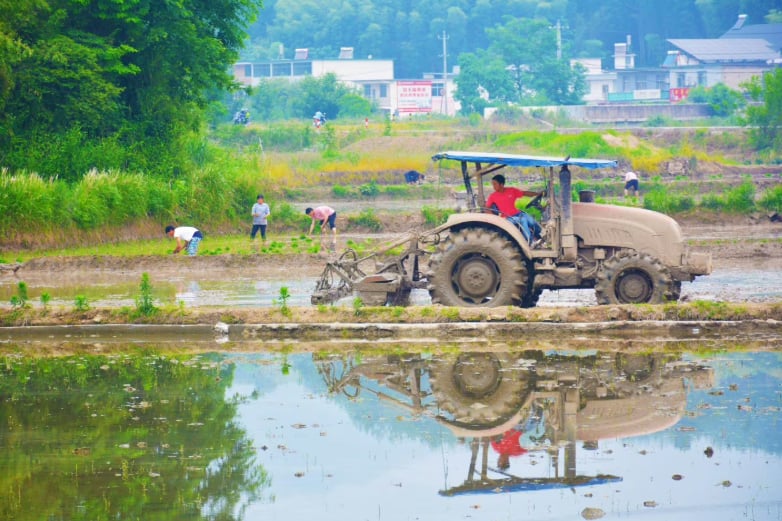November 19, 2025 | 15:42 GMT +7
November 19, 2025 | 15:42 GMT +7
Hotline: 0913.378.918
November 19, 2025 | 15:42 GMT +7
Hotline: 0913.378.918

Farmers till rice fields and transplant rice seedlings in Anqing city, Anhui province, China, June 4, 2023. Photo: CFOTO/Sipa USA.
Carbon credit registry Verra has suspended activities by four auditors related to carbon credit projects they vetted in China which claimed bogus emission reductions.
In an unprecedented move, TÜV Nord, China Classification Society Certification Company, China Quality Certification Center and CTI Certification will be prevented from auditing agriculture and forestry offsetting schemes on Verra’s registry. For German certification giant TÜV Nord, the measures will only apply to its operations in China. It is the first time Verra has taken such measures.
The auditors certified the activities of 37 programmes that aimed to slash planet-heating methane gas releases from rice fields across China, resulting in the generation of millions of carbon offsets. But Verra revoked the projects in August 2024 after a 17-month review found a string of integrity failures that the auditors had failed to identify.
Before this week’s suspension, Climate Home previously reported on ten of these projects closely linked to energy company Shell and revealed evidence raising serious doubts over whether any emission-cutting activities had been carried out on the ground at all.
Nearly 2 million worthless carbon credits produced by the projects – and partly used to offset emissions from Shell’s gas business – still need to be compensated.
As it axed the projects last year, Verra told the four auditors to produce a “strong” action plan that would prevent similar failures from happening again. But Verra said on Tuesday the responses had proved to be inadequate, prompting it to slap suspension measures on the certifiers.
The suspension will be lifted only if the auditors address the issues and meet Verra’s reinstatement requirements.
“This decision was not made lightly, but Verra’s commitment to integrity means upholding the highest standards of quality and trust, and maintaining market confidence must come first,” Justin Wheler, Verra’s chief program management officer, said in a written statement.
Voluntary carbon market standards like Verra rely heavily on external auditors to assess projects and their compliance with the rules, while the registry only gives the final stamp of approval. But auditors are picked and paid directly by project developers, something that, experts say, raises the risk of conflicts of interest.
Verra’s suspension will have immediate repercussions for projects that had contracted the services of any of the four auditors.
Verra said that it will not accept project registrations or requests to issue credits that rely on audits done by the certifiers affected by the measure. Those that have already undergone an audit carried out by suspended auditors will have to repeat the process with a new entity. A spokesperson for Verra told Climate Home at least 57 projects will be directly affected.
“While we recognize the impact of this suspension on affected projects, ensuring rigorous and credible validations and verifications is critical,” said Verra’s Wheler.
TÜV Nord is one of the world’s largest certification companies and, according to its website, it has vetted thousands of carbon credit projects both in the voluntary market and the United Nation’s Clean Development Mechanism. Climate Home has approached the company for comment.
China Classification Society Certification Company, China Quality Certification Center and CTI Certification are among China’s biggest certifiers of products and services, including emission reduction programmes.
Meanwhile, Verra has still been unable to obtain compensation for the 1.8 million worthless credits generated by ten rice farming projects that Shell directly supported in China. As Climate Home previously reported, the energy giant abandoned the projects soon after being informed that the sham offsets would need to be paid back.
The carbon credit registry sanctioned the project developer Hefei Luyu after the Chinese company failed to reply to Verra’s emails and compensate for the credits. But, in contrast, Verra has not taken any action against Shell – the world’s largest buyer of carbon offsets.
Shell used at least half a million credits produced by the Chinese rice farming projects to claim that shipments of liquefied natural gas (LNG) sold to clients were “carbon neutral”.
climatechangenews

(VAN) Prime Minister Pham Minh Chinh has issued an official dispatch directing focused response efforts and the swift remediation of damage caused by recent floods in the Central region.

(VAN) Deputy Minister Nguyen Thi Phuong Hoa calls for prioritizing the livelihoods of coastal residents, particularly those impacted by marine economic development projects.

(VAN) People can now submit their land-use right certificates ('red books') via the VNeID application. This marks an essential step toward fully paperless public services in land administration in the near future.

(VAN) Fishermen and authorities in Khanh Hoa province are demonstrating strong resolve in the fight against IUU fishing, aiming to develop a sustainable fisheries sector and remove the European Commission's (EC) ‘yellow card.’

(VAN) Viet Nam has declared that it will develop and implement strong greenhouse gas reduction measures to achieve Net Zero emissions by 2050 and it is following through on that commitment.

(VAN) A comprehensive legal framework, tailored to domestic conditions, serves as the foundation guiding economic sectors toward low-emission development.

(VAN) Mastering technical skills and leveraging the advantages of Dau Tieng Lake, residents of Loc Ninh have created a sustainable pathway out of poverty.